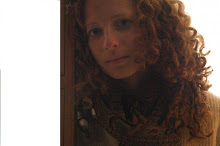 I recently attended the Teva Learning Center Conference at Surprise Lake Camp in Putnam County, NY. There I encountered many individuals and groups who are passionate and very active in all types of greenery. As I was immersed in nature again, I started putting some pieces of the puzzle together. I want to share with you some stories which inspired me, and motivate me to move forward in the United States.
I recently attended the Teva Learning Center Conference at Surprise Lake Camp in Putnam County, NY. There I encountered many individuals and groups who are passionate and very active in all types of greenery. As I was immersed in nature again, I started putting some pieces of the puzzle together. I want to share with you some stories which inspired me, and motivate me to move forward in the United States.One example is the Topsy Turvy Climate Change Bus, which four Teva staff members drove to Jewish Educational program across the US. The bus is two buses merged into one. There are wheels on the top and there are wheels on the bottom. The bus serves as a crazy visual teaching tool, which garners interests simply as it rolls up to a site.
The bus ran on vegetable oil, which Teva staff collected for free from restaurants. This also reduces costs for restaurants...resulting in a mutually beneficial relationship. According to Teva Staffer, Jonathon Dubinsky, diesel engines were designed to run on peanut oil; therefore they are compatible with vegetable oil. As a side note, cars have gas engines which can only ran on petroleum. The bus carried three different oil tanks on board. It is a unique process where the oil was shifted from one to another, while the bus is in motion.

The bus ran on vegetable oil, which Teva staff collected for free from restaurants. This also reduces costs for restaurants...resulting in a mutually beneficial relationship. According to Teva Staffer, Jonathon Dubinsky, diesel engines were designed to run on peanut oil; therefore they are compatible with vegetable oil. As a side note, cars have gas engines which can only ran on petroleum. The bus carried three different oil tanks on board. It is a unique process where the oil was shifted from one to another, while the bus is in motion.

On board the converted bus, the staffers taught a variety of environmental awareness lessons. They used compost bins filled with worms to teach children about vermicomposting. They also brought a bicycle with them to teach about pedal power. They also encouraged the children to make pledges towards small changes in their life. The children were encouraged to make energy pledges, such as reusing water bottles, which falls under a start small philosophy of change.
From my nutrition background, I am familiar with models of human behavior change. I fully support empowering individuals to make positive changes in their lives, even if they start small. Small change is real change. It makes changes more accesible, and it is not overwhelming. Once an individuals feel a sense a accomplishment about one change they have made, it can then further enable individuals to make even more changes. It is a slow and steady progression.
To learn more about the bus, click here: http://jewishclimatecampaign.org/ or here:
http://jclimatebus.wordpress.com/.
http://jclimatebus.wordpress.com/.
 In May, before I left Chava v'Adam, my former farm in Israel, I was thinking over some of the waste that plagues urban areas. Specifically, I wondered if restaurant waste could be turned into compost. I sat in the mud salon, surrounded by other Americans participating in the Eco Israel program (http://www.eco-israel.org/). Many of us had been in the restaurant business, in one form or another. Together, we discussed the potential for this project, but I could not wrap my head around incentives for restaurants to participate in better waste management practices.
In May, before I left Chava v'Adam, my former farm in Israel, I was thinking over some of the waste that plagues urban areas. Specifically, I wondered if restaurant waste could be turned into compost. I sat in the mud salon, surrounded by other Americans participating in the Eco Israel program (http://www.eco-israel.org/). Many of us had been in the restaurant business, in one form or another. Together, we discussed the potential for this project, but I could not wrap my head around incentives for restaurants to participate in better waste management practices.During the Teva Conference, I met with a woman from Rochester, NY, who told me that these projects were already in existence. I apologize in advance, since I am not aware of their names. But there are companies who pick up produce waste from Wegmans, businesses and restaurants for a small fee. Again, the businesses are motivated by reducing spending costs. It cost them less to sell their 'waste' to a middle man, than to pay for trash removal expenses. The project then produces their own organic compost, which they can sell at a high cost to nearby farmers.
From nothing into something. But was it ever nothing? Nope, it just needed us to flip in our perspectives. This project brought me a whole lot of happiness. Please let me know if you have heard of more like these in the United States.

As always, your posts are so inspiring! My restaurant "donates" our green waste to the local student farm for compost. Thanks for posting this, D, it's always nice to reinforce the idea that even small change is real change!
ReplyDeleteI'm pretty sure San Francisco's new mandatory composting includes mandatory composting for restaurants.
ReplyDelete